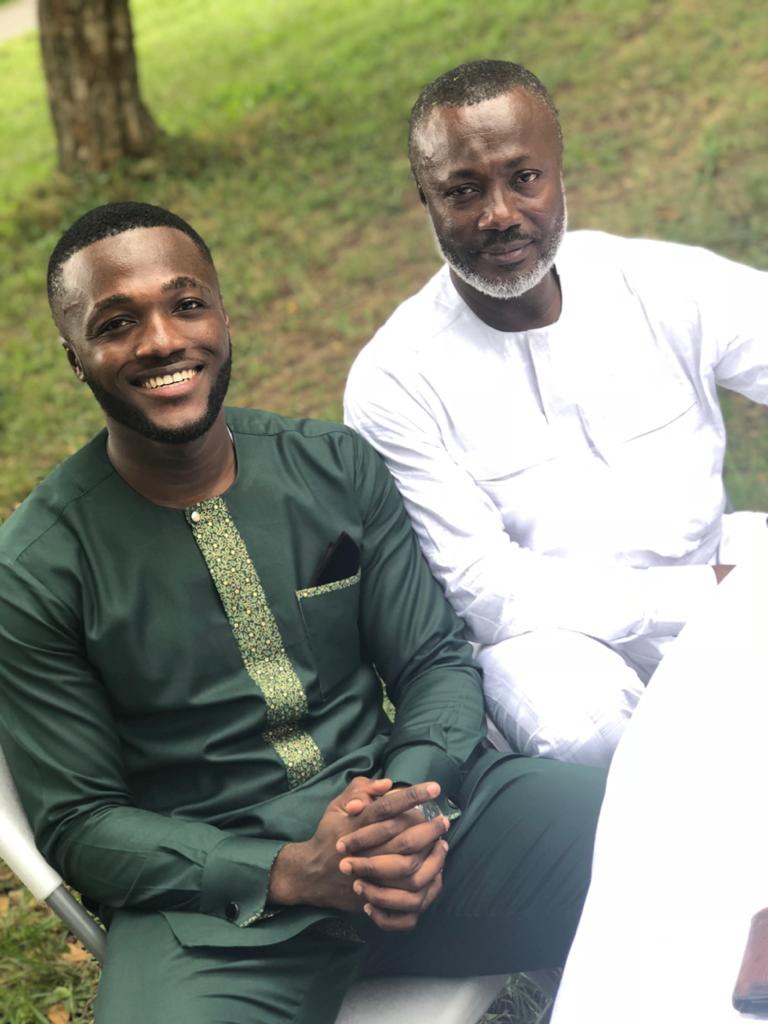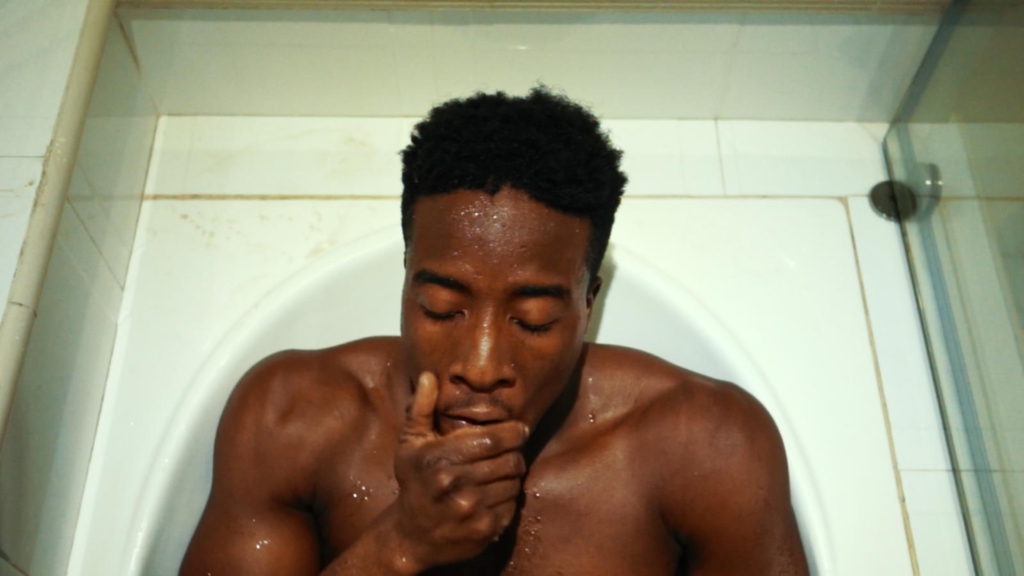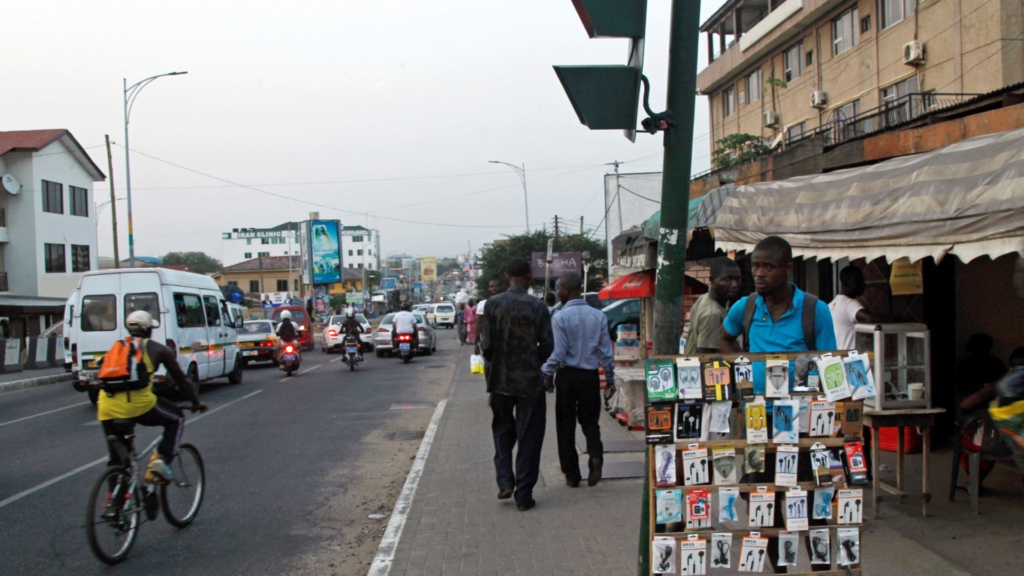Oti Agyemang Prempeh recalls the time in 2017 he found the courage to talk to his father about living with depression and anxiety.
"Even if I couldn't tell him, that 'by the way, I tried to kill myself two days ago' I wanted to tell him that I am going through some things and I just really need you to be there for me in any way that you can," the 26-year-old says, solemnly.
When Prempeh was 12, his parents' marriage ended and his mother moved to the United States. Even though he was still in regular contact with her, he says he felt abandoned.
"As time went on, [that feeling] became anger and at the same time, I started to withdraw from people; I became less social," he says. "The first thing I started struggling with was social anxiety. I would panic in social situations or even worse, I would avoid interacting with people."
In university, it got very bad. "It was anxiety with episodes of depression where I just didn't want to do anything. I wasn't going to class; I wasn't trying to see anybody, I would just stay in my room all day."
"I ended up basically failing my first year of university, I had to take it all over again," he says.
With the help of his girlfriend, he managed to get back on track and completed a degree in banking and finance in 2017. But after graduating, their relationship ended.
"This sent me down another spiral. That was when I think my anxiety was the worst it had ever been."
He was also unemployed at the time and all his bottled up emotions overflowed and led to a near breaking point.
'I did not want to be vulnerable'
But Prempeh's conversation with his father about his mental health did not go as planned.
"He just kept on saying I should pray more and that the next weekend, I should come to church with him and that once I accept Christ as my Lord and personal saviour, all these things will go away. It made me pretty sad, it was disappointing," says Prempeh, who identifies as an atheist.

He opened up about the incident to his friends, and one of them told him about a clinic run by a non-governmental organisation where he could sign up for talking therapy - a form of treatment which involves patients engaging in open discussions about their thoughts and feelings with a licensed psychologist. Another friend stayed with Prempeh over the weekend and then drove him to the clinic the next Monday.
The sessions "actually helped; being able to talk and say things out loud," he now says, even though he was initially hesitant to attend.
"I think a part of me didn't want to be vulnerable in front of another man who I don't know. But [the therapist] was a kind, young man, not much older than I was, and he was just very reassuring. He never made me feel like I was silly, stupid or being melodramatic about everything that was happening to me," he says.
But at 120 cedis ($20) per session, Prempeh - unemployed at the time - was only able to afford three sessions.
Even for those with a job, mental healthcare comes at a high cost. The minimum monthly wage in Ghana is 320 cedis ($55), and Ghana's national health insurance scheme does not cover the cost of talking therapies and many other treatments for mental health conditions.
There is also a shortage in the number of qualified practitioners in the country. There are currently 538 counsellors and psychologists licenced by the Ghana Psychology Council to practice in a country with a population of about 30 million.
Sparking conversation
In the recently released short film, 'Boys No Dey Cry' (Pidgin English for Boys Don't Cry), Joojo, the lead character, tries to take his life. He asks his therapist: "What kind of man will I be if I cry?"
The film explores men's mental health and hyper-masculinity in hyper-religious Ghana, its screenwriter Joewackle J Kusi tells Al Jazeera. At the end of the film, it is revealed that the therapist is actually Joojo talking to himself.

Kusi says he wanted the film to "spark a conversation that we should have had a very long time ago. We live in a space that does not allow us to have certain conversations that people would rather like to pretend do not exist."
"I just wanted to create a conversation where men will feel it is okay to talk about their mental health and define masculinity [for themselves]," he says.
In this deeply religious society, where 94 percent of the population profess a religion, mental health conditions are commonly perceived as the work of sinister supernatural elements like witches and evil spells. People living with psychosocial disabilities can face torture in prayer camps where they are often shackled in chains.
While prosecutions are rare, attempting suicide is a crime in Ghana, another example of the many laws introduced during the British colonial era that are still in force across some independent Commonwealth countries. During a recent discussion in Parliament on its decriminalisation, the minority leader said attempting suicide was an "unacceptable behaviour [that] must be punished and deterred".
In Ghana, mental health is "laden with a lot of stigma, mostly because of a lack of understanding about what mental health is," Accra-based psychologist Dr Carol Mathias-O'chez tells Al Jazeera. "At the core of it, we associate mental health with mental illness and the naked person walking on the street."
Again, in Ghana (and across Africa), there is a language of denial that exists with comments like 'Africans don't get depressed' common in everyday conversations.
Aside from the societal barriers, there are also institutional challenges including access to mental healthcare and the quality of that care, Dr Mathias-O'chez explains.
For Ghanaian men, there is also the added battle with patriarchy and its idea of what masculinity is. "As a society, we associate mental health challenges with weakness, and we are not very forgiving or accommodating of men showing weakness," Dr Mathias-O'chez says.
Normalising discussions
Despite the challenges, Dr Mathias-O'chez acknowledges that Ghana is rapidly modernising and gender socialisation is also becoming less rigid, thanks to increases in women's education, urbanisation and return migration from the West. This means a new generation of middle-class, young and educated men are unafraid to broach the topic of mental wellbeing.
While most of her private clients are women, Dr Mathias-O'chez says she has witnessed an increase in the number of male clients at her private practice.
In 2018, the country's first men's mental health summit was held and, every quarter, there is a breakfast meeting in Accra for both men and women to convene and commune about their mental health.
In 2018, a popular rapper talked openly on television about his two-year battle with depression. And he has not been the only one to do so recently. In his latest album, 'For My Brothers', hip-hop artist Kojo Cue tackles masculinity and explores mental health in the song 'Never Mind'.
"I have had my own issues with depression, and I have realised that most of the time, sharing helps," he tells Al Jazeera. "It was easy to make the song, what was not so easy was to put the song out. When you are on the verge of releasing the song, you start to think of how people will receive it. Even in the song, I say that there are certain things that I am still not confident enough to talk about."

On social media, a growing number of men are also talking about their mental health, their struggles and coping mechanisms. Last November, Prempeh received a lot of praise after he tweeted about his experience. He says he received many messages from young men also dealing with their own mental health conditions. "I couldn't offer to fix their situations but the fact that we had that solidarity, it felt good on my part, and I hope it felt good on their part, too," he says.
But in other spaces, change is happening more slowly. Prempeh says he has a good relationship with his father and is no longer angry about the encounter in 2017. However, "that was the last time, I have ever tried talking to him about [mental health]. If I ever feel like I need to talk to a parent, I just call my mum," he says matter of factly. Prempeh says he still "struggles with anxiety" and hopes to be back in therapy as soon as the coronavirus pandemic ends.
For lasting change to occur, Dr Mathias-O'chez says there is a need to normalise open discussions about mental health "so that people don't feel like it is something to be ashamed of".
She uses Twitter to raise awareness about mental health, debunk myths, and to spread information about the currently available resources to her 2,600 followers and beyond. "I have seen that it has had some impact in terms of people being willing and bold and able to speak about their mental health challenges," she says.
It is a discussion rapper Kojo Cue wants to contribute to positively. He says he hopes that by speaking openly about mental health, his largely young male fan base will "understand that they are not alone" and find "the courage to also speak about it or at least seek help".
Latest Stories
-
Today’s front pages: Monday, November 25, 2024
10 mins -
T-bill auction: Government misses target again; interest rates continue to rise
13 mins -
We have a bad technical team; Otto Addo and his team should go – Ernest Thompson
2 hours -
Hindsight: Why Accra Lions’ present problems do not define them
2 hours -
10-year-old Lisa Laryea arrives at Wits Donald Gordon Hospital in South Africa for bone marrow transplant
2 hours -
23 ambassadors inducted to take on 2025 GSTEP Challenge in three regions
3 hours -
Ghana Shea Workers Union inaugurated
3 hours -
Microsoft 365 under attack – how to bulletproof your business against cyber threats
3 hours -
I trust Bawumia; he has never lied to me – Akufo-Addo
3 hours -
Bawumia is hardworking; offers the youth platform to share ideas – Kow Essuman
3 hours -
IGP, Police commanders worship with churches in Ghana as part of security arrangements for 2024 elections
3 hours -
Mahama is a failed president; give Bawumia a chance – Akufo-Addo to Ghanaians
3 hours -
‘No child left behind in Free SHS’ – Akufo-Addo declares
4 hours -
MMDAs tasked to pay more attention to TB cases
4 hours -
2024/25 GPL: Defending champions Samartex suffer second consecutive loss as Basake Holy Stars wins 1-0
4 hours

